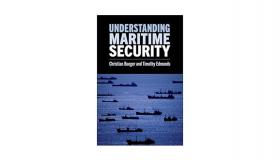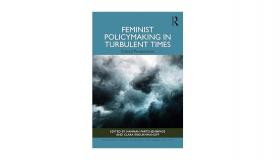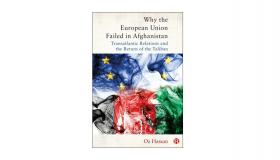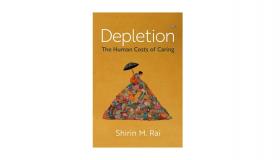
Breadcrumbs navigation
The latest in IR - autumn book round up
Welcome to our quarterly book round up. Each quarter we bring you updates on the latest International Studies releases by BISA members. To be included in the next update contact Communications Manager, Chrissie Duxson: Chrissie.Duxson@bisa.ac.uk
Race in the Anthropocene
Coloniality, Disavowal and the Black Horizon
Farai Chipato and David Chandler

Farai Chipato is Lecturer in Black Geographies at the University of Glasgow. David Chandler is Professor of International Relations at the University of Westminster. He edits Anthropocenes: Human, Inhuman, Posthuman and has published widely on the Anthropocene, political ontology, and international theory.
Blurb
Race in the Anthropocene provides a radical new perspective on the importance of race and coloniality in the Anthropocene. It forwards the Black Horizon as a critical lens which places at its heart the importance of ontological concerns fundamental to problematising the violences and exclusions of the antiblack world.
At present, multiple new approaches are emerging through the shared problem field of Anthropocene thought and policy, offering to save not just the world, but the practice of governance, the business of Big Data, the progress of development, and the dream of peace. It is against this backdrop that Race in the Anthropocene unsettles not just the already shaky foundations of modernity but also the affirmative visions of its critics, by directing our gaze to how race and coloniality are baked into the grounding concepts of international thought.
This book is essential reading for students of International Relations, particularly those interested in international politics, security, and development. It is also of relevance for those interested in contemporary social, political, and environmental debates and policy practices.
Find out more and purchase the book via the Routledge website
Understanding Maritime Security
Christian Bueger and Timothy Edmunds

Timothy Edmunds is Professor of International Security and Director of the Global Insecurities Centre at the University of Bristol. He is also one of the directors of the SafeSseas network. Between 2015-19, he was founding Editor-in-Chief of the European Journal of International Security for Cambridge University Press and the British International Studies Association (BISA). His work addresses issues of security policy, capacity building, and security sector reform, with focus on the maritime domain.
Blurb
Whether it is pirates, smugglers, illicit fishing, or disputes in the South China Sea, the oceans are of increasing importance in international security. In Understanding Maritime Security, Christian Bueger and Timothy Edmunds provide a concise introduction to the history of security at sea and explain the core frameworks of analysis that professionals use to understand and tackle challenges to maritime order. They discuss key issues within the maritime security agenda, including inter-state disputes, terrorism, piracy, smuggling, trafficking, and illicit fishing, and examine how states have responded. Bueger and Edmunds analyze future trends and show how maritime security is impacted by the critical infrastructure agenda, emerging technologies, cyber security, climate change, biodiversity loss, and the renaissance of geopolitics. Comprehensive and incisive, this primer of maritime security is essential reading for maritime security professionals and students of this increasingly important issue.
Find out more and purchase the book via the Oxford University Press website
Feminist Policymaking in Turbulent Times
Critical Perspectives
Edited By Hannah Partis-Jennings and Clara Eroukhmanoff

Clara Eroukhmanoff is a senior lecturer in International Relations in the School of Law and Social Sciences at London South Bank University, UK. Her current research lies at the intersection of feminist writing in International Relations, gender, and foreign policy, with a particular focus on French feminist diplomacy, US declinism, the remasculinisation of international politics and anti-genderism, and Trumpism.
Blurb
Feminist Policymaking in Turbulent Times offers a unique and timely reflection of the critical debates around the institutionalisation of feminist and gender-focused ideas and norms into policy.
Many states and non-governmental organisations are increasingly invested in ‘feminist policymaking’ at the domestic and international levels. Yet, this liberal (feminist) agenda is also vastly disputed by critical, intersectional, and decolonial voices on the one hand, and by anti-gender movements around the world on the other hand. Indeed, while opposition to ‘gender ideology’ is mounting from reactionary, religious, and secular forces, feminist policymaking is also being challenged in important ways from within. Thus, this book situates feminist policymaking in a challenging and ‘turbulent’ global context. This book explores feminist policymaking in multiple areas of policy, examining various gender-focused programmes that states and international organisations have undertaken in the last decade, offering critical interventions and rethinking the relationship between feminism and policy. This book not only reflects on the advances of feminist policymaking globally but also critically assesses the intersectional challenges embedded within it and lying ahead. It moves the field forward by creating opportunities, based on lived experiences, for re-imagining the transformative potential of the nexus between feminism and policymaking. Interdisciplinary in scope and bringing to the fore the voices of both academics and practitioners, this book is the product of an international collaboration, forging links and dialogue that are increasingly necessary to question some of the exclusionary, militaristic, and hierarchical assumptions of policymaking which is labelled as feminist.
Find out more and purchase the book via the Routledge website
Nostalgic Virility as a Cause of War
How Leaders of Great Powers Cope with Status Decline
Matthieu Grandpierron

Matthieu Grandpierron is associate professor of international relations and political science at the Catholic University of Vendée.
Blurb
Why do great powers go to war? Why are non-violent, diplomatic options not prioritized? Nostalgic Virility as a Cause of War argues that world leaders react to status decline by going to war, guided by a nostalgic, virile understanding of what it means to be powerful. This nostalgic virility - a system of subjective beliefs about power, bravery, strength, morality, and health - acts as a filter through which leaders articulate glorified interpretations of history and assess their power and their country’s status on the international stage.
In this rigorous study of France, the United Kingdom, and the United States, Matthieu Grandpierron tests the theory of nostalgic virility against the two more common theoretical frameworks of realism and the diversionary theory of war. Consulting thousands of newly declassified government documents at the highest levels of decision making, Grandpierron examines three specific cases - the early years of the Indochina War (1945-47), the British reconquest of the Falklands in 1982, and the US invasion of Grenada in 1983 - convincingly contending that status-seeking behaviour and nostalgic virility are more relevant in explaining why a leader chooses war and conflict over non-violent, diplomatic options than the dominant frameworks.
Looking to the recent past, Nostalgic Virility as a Cause of War considers how this new model can be applied to current conflicts - from the Russian war in Ukraine to Chinese actions in the South China Sea - and provides surprising ways of thinking about the relationship between power, decision makers, and causes of war.
Find out more and purchase the book via the McGill-Queen’s University Press website
Why the European Union Failed in Afghanistan
Transatlantic Relations and the Return of the Taliban
Oz Hassan

Oz Hassan is Reader in National Security at the University of Warwick. He authored the European Parliament’s Committee on Foreign Affairs study on Afghanistan and is a recipient of the Middle East Policy Council 40 Under 40 award.
Blurb
The return of the Taliban has undermined EU external action, reversed twenty years of state-building efforts and represents the most significant failure of EU foreign policy to date.
Drawing on over 100 hours of interviews with key actors and an in-depth examination of the EU’s state-building efforts, this book offers unparalleled insights into the complex interplay between transatlantic relations and the resurgence of the Taliban. It critically evaluates the EU's strategies, advocating for a nuanced, historically informed approach to international relations.
Indispensable for academics, policy makers and anyone vested in the intricacies of foreign interventions in an ever-complex global environment.
Find out more and purchase the book via the Bristol University Press website
Fixing Gender
The Paradoxical Politics of Training Peacekeepers
Aiko Holvikivi

Aiko Holvikivi is Assistant Professor of Gender, Peace and Security at the LSE Department of Gender Studies. She was the recipient of the 2020 Michael Nicholson thesis prize from BISA.
Blurb
The practice of "gender training" has gained widespread popularity among numerous professions in the last few decades, even becoming a requirement for soldiers and police officers deploying overseas as peacekeepers. But what happens when the concept of gender, the analytical purchase of which we owe to feminist activism and scholarship, is taken up by martial institutions shaped by hegemonic masculinity? This ethnographic study examines how gender is conceptualised, taught, and learned in these settings, and with what political effects. The book argues that this training constitutes a deeply ambivalent practice. On the one hand, it reinscribes the logic that martial force is an appropriate solution to gendered insecurities, and affirms attachments to normative heterosexuality. On the other hand, this training exposes contradictions that inhere to the logics of martiality, coloniality, and heteronormativity that structure the peacekeeping enterprise. Drawing on queer and postcolonial feminist thought, Fixing Gender examines the contradictory politics of gender training, arguing that we need to develop the analytical tools to grapple with paradoxical practices that are simultaneously good and bad feminist politics.
Find out more and purchase the book via the Oxford University Press website. You can use the offer code AAFLYQ6 for 30% off.
Causal Inquiry in International Relations
Adam R C Humphreys and Hidemi Suganami

Adam R C Humphreys is Associate Professor, Department of Politics and International Relations, University of Reading, and Hidemi Suganami is Emeritus Professor of International Politics, Aberystwyth University.
Blurb
Causal Inquiry in International Relations defends a new, philosophically-informed account of the principles which must underpin any causal research in a discipline such as International Relations. Its central claim is that there is an underlying logic to all causal inquiry, at the core of which is the search for empirical evidence capable of ruling out competing accounts of how specific events were brought about. Although this crucial fact is obscured by the 'culture of generalization' which predominates in contemporary social science, all causal knowledge ultimately depends on the provision of empirical support for concrete claims about specific events, located in space and time.
This book not only explores existing philosophical debates around causation, but also provides a detailed study of some of the most fundamental methodological questions which arise in the course of causal inquiry. Using examples drawn from philosophy and from the study of international relations, it demonstrates what is problematic about established ways of thinking, brings new clarity to both philosophical and methodological questions, and seeks to enhance collective understanding of the contribution that causal inquiry can make to empirically rich and critically aware scholarship about world politics. It concludes by situating 'causal inquiry' in relation to other forms of inquiry employed in the study of world politics, emphasizing especially the often-unnoticed dependence of causal inquiry on precisely the kind of knowledge of specific events which historians are well-placed to provide.
Find out more and purchase the book via the Oxford University Press website. You can also download a free e-book.
Good Victims
The Political as a Feminist Question
Roxani Krystalli

Roxani Krystalli is a Lecturer (Assistant Professor) at the University of St Andrews. Her research and teaching focus on feminist peace and conflict studies, as well as on the politics of nature and place. Krystalli's work within and beyond the academy is aimed at understanding how people reimagine worlds in the wake of loss.
Blurb
As of 2023, over nine million Colombians have secured official recognition as victims of an armed conflict that has lasted decades. The category of "victim" is not a mere description of having suffered harm, but a political status and a potential site of power.
In Good Victims, Roxani Krystalli investigates the politics of victimhood as a feminist question. Based on in-depth engagement in Colombia over the course of a decade, Krystalli argues for the possibilities of politics through, rather than in opposition to, the status of "victim." Encompassing acts of care, agency, and haunting, the politics of victimhood entangle people who identify as victims, researchers, and transitional justice professionals. Krystalli shows how victimhood becomes a pillar of reimagining the state in the wake of war, and of bringing a vision of that state into being through bureaucratic encounters. Good Victims also sheds light on the ethical and methodological dilemmas that arise when contemplating the legacies of transitional justice mechanisms.
Find out more and purchase the book via the Oxford University Press website. You can use the offer code AUFLY30 for 30% off.
Depletion
The Human Costs of Caring
Shirin M Rai

Shirin M Rai is Distinguished Research Professor of Politics and International Relations at SOAS, University of London, and a Fellow of the British Academy. Her research interests are in the fields of political economy of development, gender and political institutions, and performance and politics. She is the author, co-author, or co-editor of several books, including Performing Representation: Women Members in the Indian Parliament and The Oxford Handbook of Politics and Performance.
Blurb
When thinking about the work of caring for others we often neglect the human cost born by those performing this care. Feminists have long talked about the ways in which unpaid work, particularly performed in the home, is habitually undervalued by society; but the work of caring for people, both paid and unpaid, can also take a toll on the health of individuals, households, and communities when we give more than we receive. This lopsided gap between outflows and inflows, as this book argues, is depletion.
In Depletion, Shirin M Rai examines the human costs of care work and how these are reproduced across the boundaries of class, race, gender, and generation. Depletion can be physical, as measured by the body mass index, exhaustion, sleeplessness, and vital health signs. It can also be mental, manifesting as self-doubt, guilt and apprehension, and the failure to take time for oneself, family, friends, and community. Moreover, depletion has effects that extend well beyond the individual, to households and communities.
Including case studies from different parts of the world and building on various methodologies, Rai looks at the costs of care work, or what she calls "social reproduction" in several forms: biological reproduction, unpaid work in the home, and cultural and ideological work necessary to maintain social relations beyond the household. Various chapters examine the costs of commuting to work and for care, the value of unpaid work performed by women of different classes, the costs of household work performed by children, and the costs to communities when local economies are challenged by corporate interests. Lastly, Rai argues that depletion must be recognized in order for it to be reversed—the struggles to reverse depletion are struggles for a good life, generative of new imaginings of how care work, both draining and joyful, can be reorganized for a better future for all.
Find out more and purchase the book via the Oxford University Press website.
Security Studies
An Applied Introduction
Edited by Norma Rossi and Malte Riemann

Norma Rossi is Associate Lecturer in International Relations, University of St Andrews, UK. Malte Riemann is Assistant Professor in Contemporary Armed Conflict, Leiden University, the Netherlands.
Security Studies: An Applied Introduction is the perfect introduction for undergraduate and postgraduate students studying Security Studies and International or Global Security. With chapters written by leading security studies experts, it offers a transformative tool to understand, analyse, and engage with the complexities of security in the modern world. This groundbreaking new text redefines the landscape of security studies with the following features:
- Policy-Relevant: each chapter provides analysis of policy responses to empirical security issues. This practical approach offers a toolkit to assess and contribute to real-world policy discussions.
- Empirical Application: vividly demonstrating the real-world relevance of Security Studies with online videos from leading security practitioners to show how theory informs practice.
- Pedagogically Rich: comprehensive online resources and chapters features such as 'security beyond the real' and hands-on exercises that critically assess real-world security responses and their policy implications that offer ways to apply theoretical concepts in a highly innovative way.
- Innovative Structure: seamlessly integrating theoretical perspectives with empirical security concerns, this textbook offers a non-compartmentalised approach to theory and practice.
- Hot Topics: placing contemporary, creative, emerging, and underexplored approaches and empirical topics at the forefront including cyber security, racism, and space security.
Find out more and purchase the book via the Sage Publications website.
If you're a BISA member and you'd like your book included in next quarter's round up, email Communications Manager, Chrissie Duxson: Chrissie.Duxson@bisa.ac.uk. Please include the title, blurb and a link to where the book can be purchased. If you are able, you can also include details of any discount available, but of course this is not required. The book should have been published a maximum of six months prior to your email.
Top photo by Phil Hearing on Unsplash